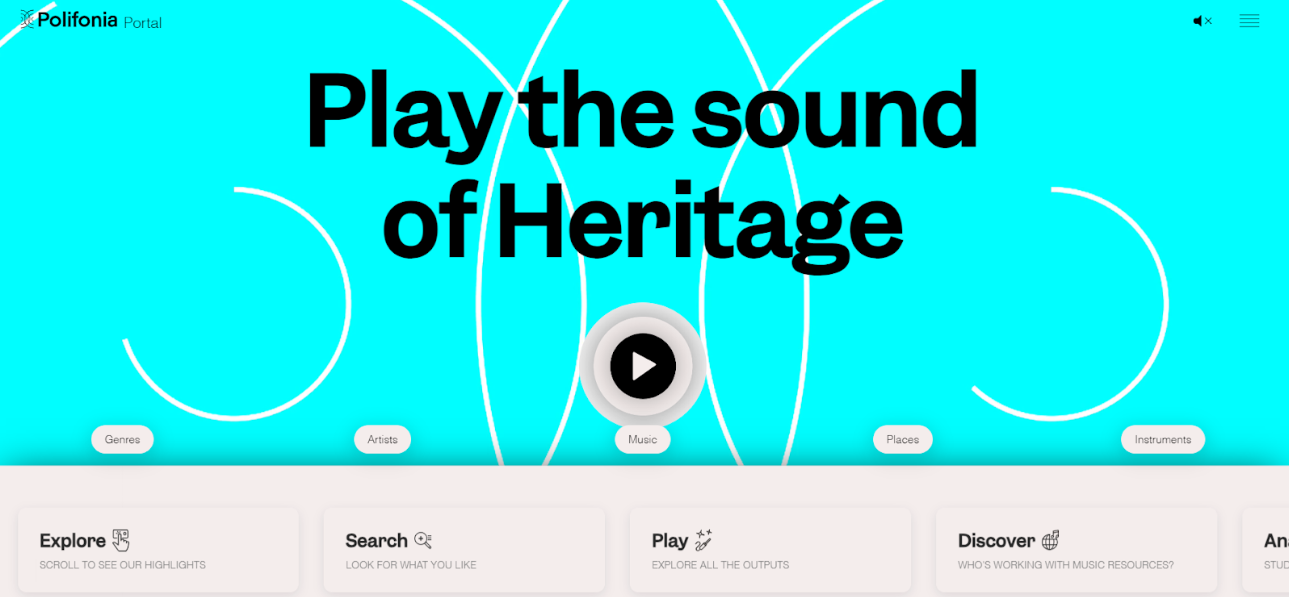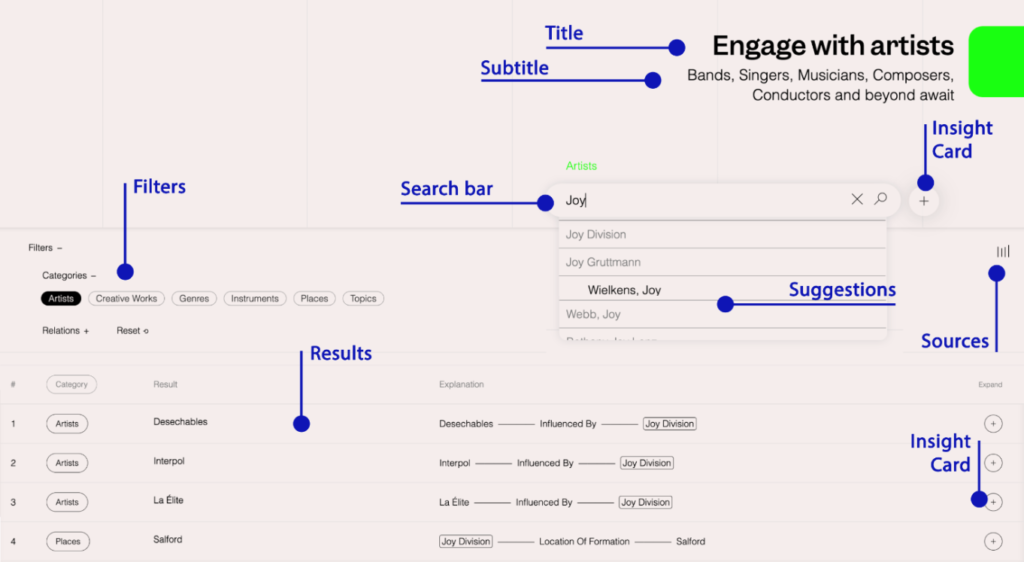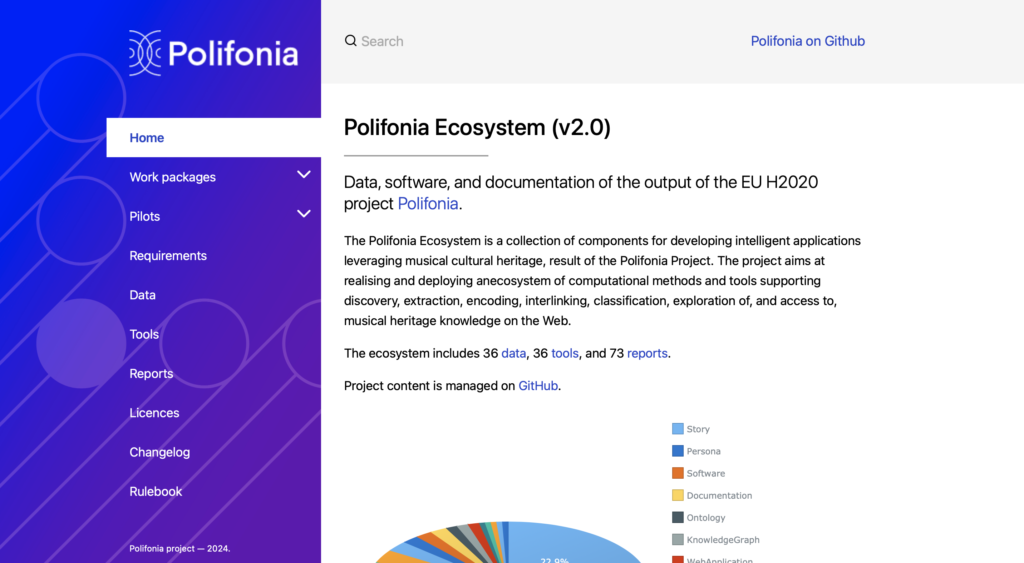#pressrelease Project completed: Explore European musical heritage with Polifonia Web Portal
After four years of development work, the Polifonia project team is excited to present the results. The consortium, consisting of 10 partners from Italy, the Netherlands, France, England and Ireland launches the music discoverability platform ‘Polifonia Web Portal’. In addition, the researchers and developers have also unlocked and linked other music data, developed tools and software that will help musicologists take steps forward in their research on European musical heritage.

After four years of development work, the Polifonia project team is excited to present the results. The consortium, consisting of 10 partners from Italy, the Netherlands, France, England and Ireland launches the music discoverability platform ‘Polifonia Web Portal’. In addition, the researchers and developers have also unlocked and linked other music data, developed tools and software that will help musicologists take steps forward in their research on European musical heritage.

Launch Polifonia Web Portal
The Web Portal serves as the primary entry point to Europe’s extensive musical heritage. It gathers diverse musical resources and data, from historical data to melodic patterns, and allows both general users and experts to perform research across sources. A great asset, according to one of the project’s stakeholders:
“I love the concept. This brings music Knowledge Graphs content to people without knowledge about Linked Data.”
The Web Portal provides five specialised search sections, each corresponding to access points preferred by users, as evidenced in dedicated user studies. This approach enables efficient search and exploration of the musical heritage and it is supported by autocomplete suggestions and filtering options to refine the research.
Serendipitous discoveries
By harmonising information from various sources, the portal unveils hidden connections and narratives within the musical landscape, providing users with a comprehensive and interconnected view of our cultural heritage. The User eXperience of the portal is designed to favor such ‘serendipitous discoveries’, rather than offering pre-determined paths.
First positive stories from end users, and especially regarding these serendipitous discoveries, have already been recorded during demonstrations of the tool:
“This is a dream come true, I didn’t know such a tool existed. A search about punk rock led me to discover digitised comics about Rancid and punk subcultures.”

Music datasets better connected
The Polifonia Web Portal is a massive step towards seamless access, interconnected narratives, and boundless exploration of music heritage. Before Polifonia, our musical heritage was fragmented, scattered across disjointed datasets, available via limited search capabilities. Now, the Polifonia Web Portal changes this situation for good.
The work done is a collaborative effort between UNIBO, OU, NUIG and KCL, and is based on several datasets produced by Polifonia partners and beyond, namely: musoW, MEETUPS, CHILD, BELLS, MusicBO, ORGANS, FoNN, TUNES and Wikidata.
Other results
This is by no means all that this four-year project has yielded; research and development within the work packages and its 10 pilots also included the release of open source software, datasets and ontologies, such as: Pitchcontext, MELODY, Polifonia Knowledge Extractor, Polifonia Corpus Annotation, Sparql Anything, Polifonia Corpus, CLEF, LHARP, FACETS, Frequently Occuring Patterns, TONALITIES, Roman Chord Ontology, Music Meta, Jams Ontology, Roman Chord APIs, ChoCo, Polifonia Lexicon and MOZ. Additionally haptic devices for hearing impaired audiences have been developed and experiments with ‘Deep Listening’ were conducted.

Ecosystem
All components developed within this project can be used in conjunction, as well as in isolation. The open source components can be found in a so-called ‘Polifonia Ecosystem’ – an environment supported via GitHub, the developer platform where code can be shared and managed.
Research
During this project, the work packages also undertook the necessary research and published papers in search of solutions to Semantic Web challenges or issues within the Music information Retrieval field. Polifonia researchers won Best Research Paper Award at Extended Semantic Web Conference edition 2023 and published in Scientific Data (vol 10), part of the Nature Portfolio. All papers can be found through Zenodo.
Learn more
Polifonia Web Portal: https://polifonia.disi.unibo.it/portal/
Ecosystem: https://polifonia-project.github.io/ecosystem/
GitHub: https://github.com/polifonia-project
Zenodo; https://zenodo.org/communities/polifonia










